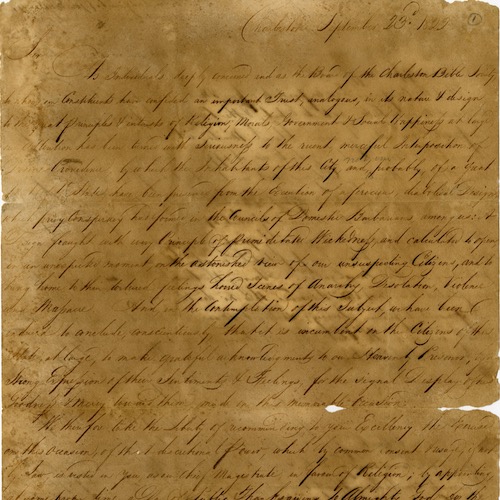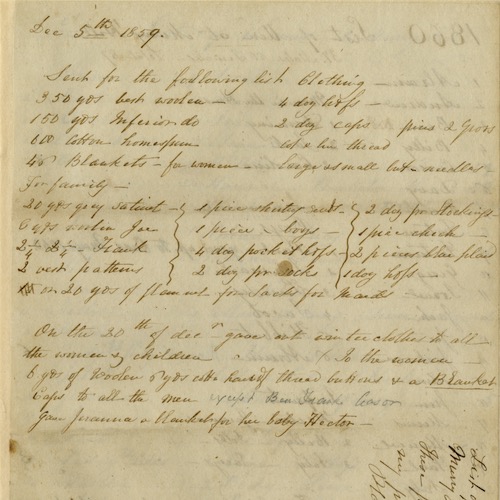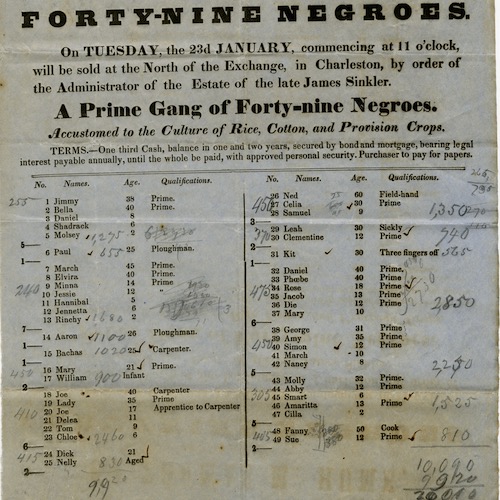About the Collection
The Ravenel Family Papers, 1695-1925, collection contains financial, estate, enslaved persons, and property records for the Ravenel family. Miss Emily Guerard Ravenel and Mrs. Mary Ravenel Gignilliat inherited these papers from their father, Thomas Porcher Ravenel (1850-1936), and donated them to the South Carolina Historical Society through Henry R. Dwight.
A Berkeley County, S.C. family, they are descended from Rene Louis Ravenel (b. 1694), a Huguenot emigre. His son, Henry Ravenel (1729-1785), was the owner of Hanover Plantation. Children of Henry Ravenel (1729-1785) included Henry Ravenel (1751-1823), Rene Ravenel (1762-1822), Paul de St. Julien Ravenel (1765-1820), and Stephen Ravenel (1770-1818), who was South Carolina Secretary of State from 1795 to 1799. Henry Ravenel (1790-1867), a physician and plantation owner (Pooshee Plantation), was the son of Rene Ravenel (1762-1822), and his children included Henry William Ravenel (1814-1887) and Thomas Porcher Ravenel (1824-1898). Thomas Porcher Ravenel, Jr. (1850-1936) was an attorney in practice in Savannah (Ga.); he married Emily Howard in 1887
Bound volumes belonging to Henry Ravenel (1790-1867), include a crop book, account book, property record and medical book. The Henry Ravenel Crop Book, 1809-1832, is a book listing the names and ages of enslaved children born on the plantation, weather conditions, crop farming and tasks completed by enslaved persons. Loose papers found in the book record names of enslaved people divided and allotted to Henry, Thomas, Rene and William Ravenel, and a note to sell a family of enslaved persons with their names and ages.
The Henry Ravenel Account Book, 1822-1833, records the purchases of goods by enslaved people as well as accounts of various members of the Dubon and Porcher families for personal goods. The Henry Ravenel Medical Book, 1816-1834, records medical visits and prescriptions for families and their enslaved persons by physician Henry Ravenel. Families seeking medical treatment include Porcher, Dubois, Gaillard, Foxworth, Marion, Moore, Ravenel, Broughton and many others. Some of the diseases and injuries being treated are rheumatic diseases, fevers, fractures, kidney disease, a miscarriage, and an amputation on an enslaved child. The Account Book of Enslaved Persons Belonging to Henry and Rene Ravenel, 1771-1867, lists the enslaved children born under the ownership of Henry and Rene Ravenel. The lists include the first name of the child, their parents, date of birth and occasionally includes notes of death or if purchased by another slave owner.
Other bound volumes in the collection include The Paul De St. Julien Ravenel Estate Book, 1829-1841, an estate account book kept by Henry Ravenel for the estate of Paul D. Ravenel with pages on money received, spent or payments paid, including payments for the hiring of enslaved people. The last few pages of the book are lists of enslaved persons, referenced by first name, and the number of sheets given out. Finally, The Day Book for Henry Ravenel Junior (1790-1867), Wood Ville, 1806-1822, lists the names of enslaved persons and their decedents, lists of purchased enslaved persons with name, name of previous owner, date and price, and enslaved persons who received shoes. The second half records family events, visits to the Pineville theatre, traveling, engagements, marriages, deaths, and attendance at the Jockey Club. Also included are entries about a hunting party to capture or kill fugitive enslaved people, the promise of emancipation for two female “mulatto” enslaved children and a trial over the body of an enslaved woman who was punished to death.




